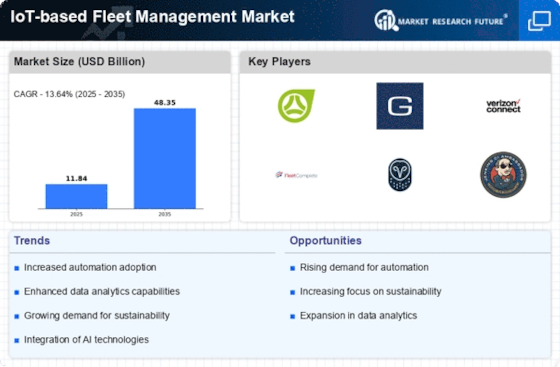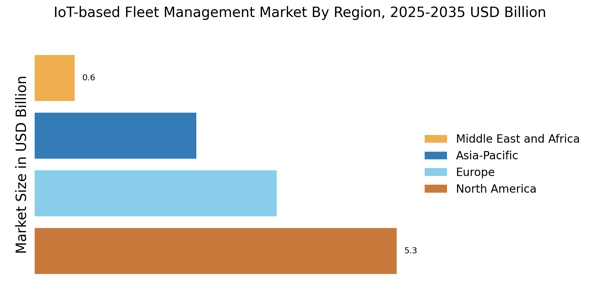Enhanced Operational Efficiency
The IoT-based Fleet Management Market is witnessing a surge in demand for enhanced operational efficiency. Companies are increasingly adopting IoT solutions to streamline their fleet operations, which can lead to significant cost savings. By utilizing real-time data analytics, businesses can monitor vehicle performance, optimize routes, and reduce fuel consumption. According to recent estimates, organizations that implement IoT-based fleet management solutions can achieve up to a 20% reduction in operational costs. This efficiency not only improves profitability but also enhances customer satisfaction through timely deliveries. As competition intensifies, the need for operational excellence drives the adoption of IoT technologies in fleet management.
Increased Focus on Fuel Efficiency
The IoT-based Fleet Management Market is significantly driven by the increased focus on fuel efficiency. With rising fuel prices and environmental concerns, fleet operators are seeking innovative solutions to optimize fuel consumption. IoT technologies provide real-time insights into driving patterns, vehicle performance, and route optimization, enabling companies to implement strategies that enhance fuel efficiency. Studies suggest that fleets utilizing IoT-based solutions can achieve fuel savings of up to 15%. This focus on fuel efficiency not only contributes to cost reduction but also aligns with broader sustainability goals, making it a compelling driver for the adoption of IoT in fleet management.
Rising Demand for Predictive Maintenance
The IoT-based Fleet Management Market is experiencing a rising demand for predictive maintenance solutions. Fleet operators are increasingly recognizing the value of IoT technologies in anticipating vehicle failures before they occur. By leveraging data from sensors and analytics, companies can schedule maintenance proactively, thereby minimizing downtime and repair costs. Research indicates that predictive maintenance can reduce maintenance costs by up to 30% and extend the lifespan of vehicles. This trend is particularly relevant as fleets become more complex and the cost of vehicle downtime escalates. Consequently, the integration of predictive maintenance capabilities into IoT-based fleet management systems is becoming a critical driver of market growth.
Regulatory Compliance and Safety Standards
The IoT-based Fleet Management Market is significantly influenced by the need for regulatory compliance and safety standards. Governments worldwide are implementing stringent regulations regarding vehicle emissions, driver safety, and operational practices. IoT solutions enable fleet operators to monitor compliance in real-time, ensuring adherence to these regulations. For instance, the integration of telematics can provide data on driver behavior, vehicle maintenance, and environmental impact. This capability not only helps in avoiding penalties but also enhances the overall safety of fleet operations. As regulatory frameworks evolve, the demand for IoT-based solutions that facilitate compliance is likely to grow, further propelling the market.
Integration of Autonomous Vehicle Technologies
The IoT-based Fleet Management Market is poised for transformation with the integration of autonomous vehicle technologies. As advancements in artificial intelligence and machine learning continue, the potential for autonomous vehicles in fleet operations becomes increasingly viable. IoT-based fleet management systems can facilitate the seamless integration of these technologies, allowing for improved route planning, safety, and efficiency. The market for autonomous vehicles is projected to grow substantially, with estimates suggesting a compound annual growth rate of over 20% in the coming years. This integration not only enhances operational capabilities but also positions companies at the forefront of innovation in the fleet management sector.


















Leave a Comment